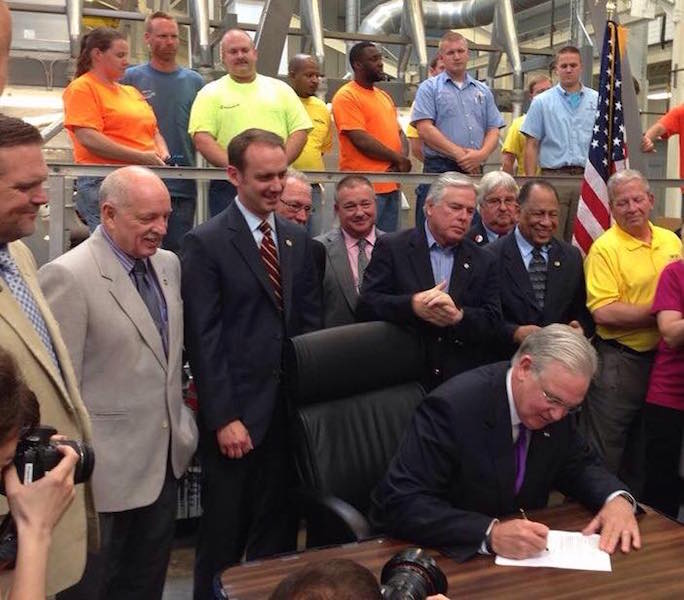
By TIM ROWDEN
Editor
To thunderous applause Gov. Jay Nixon vetoed a measure June 4 that would have made Missouri the 26th right-to-work state, calling the bill (HB 116) a threat to unionized workers and wages
“For generations, the ability of workers to join together and bargain collectively for fair wages, and training has lifted the living standards of families everywhere both union and non-union,” Nixon told a standing room only crowd at the Sheet Metal Workers Local 36 union hall and training center. The crowd included including representatives of what appeared to be every union local in the greater St. Louis area, state and local politicians and community workers’ rights activists.
“House Bill 116 is a war on your pay check,” Nixon said, as the crowd erupted in cheers. “It cannot become law!”
The bill would have barred security clauses from union contracts, meaning workers who are not union members would no longer pay a fair share free to support the union’s collective bargaining activities, although unions would still be required to offer the same services to all workers under the contract, limiting their ability to negotiate and support workers.
The bill would have also made it a class C misdemeanor – punishable by 15 days in jail and unlimited civil penalties – to require people to pay dues.
Nixon credited unions with providing U.S. workers with “a ticket to the Middle Class and the opportunity to pursue the American Dream” and vowed to spend “the next 105 days” between Nixon’s June 4 veto and the end of the Legislature’s fall veto session solidifying support to sustain his veto.
Nixon traveled to Kansas City earlier in the day to announce the veto among about 200 local United Auto Workers at the Claycomo Ford assembly plant.
‘A PROUD MOMENT’

“It’s a very proud moment,” Mike Louis, president of the Missouri AFL-CIO said of the Governor’s veto. “I hope legislators on both sides of the aisle continue to do the right thing and support the working people in the state of Missouri.”
Proponents are working hard to muster enough support in the Republican-led Legislature to override the Governor’s veto.
The Senate passed HB 116 by a vote of 21-13. It passed by 92-66 in the House. To override the veto, the Republican-controlled Legislature would need 23 votes in the Senate and 109 in the House.
Pat White, president of the Greater St. Louis Labor Council said: “The work starts now. It’s going to be our job to thank the people who were with us, and the flip the people who were on the other side of the fence.”
‘MISSOURIANS HAVE ALREADY SPOKEN’
“Missourians have already spoken on this,” said Nixon, referring to the state’s 1978 vote against a right-to-work referendum, “and we’re going to speak one more time.
“This legislation would take our state backwards, squeeze the middle class, lower wages for Missouri families and subject businesses to criminal and civil liability
“The special interests who are supporting this bill don’t want to talk about the damaging effects it would have, so they’ve given it a misleading name: ‘right-to-work.’ But the truth is right-to-work is wrong and it will not work.”
LOWER WAGES FOR ALL WORKERS
“There’s a lot of things wrong with this bill,” Nixon said. “Making it harder for workers to organize and collectively bargain will not strengthen our economy. In fact, this legislation would reduce wages for everyone. In states with these laws, workers – all workers – are making thousands of dollars less per year than they do in states that haven’t made this mistake.
Nixon questioned whether any working person and voter would support a bill that they knew would result in their getting paid less for the same job.
“Even supporters of this bill admit it will lead to lower wages,” Nixon said. “Since when did we elect people to come to power and say ‘Our job is to make sure that workers make less money?’ Folks, that’s just wrong.
“We may still have challenges with our economy, but paying workers too much is not one of those problems.”
‘BIG GOVERNMENT OVERRREACH’
Nixon said the bill was also anti-business, representing the same kind of “big government overreach” that proponents of the bill say they’re against.
“This bill represents exactly the kind of big government overreach that proponents of this bill say that they’re against,” Nixon said. “This is the government coming in and telling private companies what they can do. This is the government coming in and putting unlimited civil damages and liability and crimes against businesses.
“Employers like Boeing and GM have spent years developing skilled, reliable and safe workforces to deliver quality products to their customers. And they’ve honorably sat across the table and negotiated all kinds of things,” Nixon said. “Many other businesses don’t use union workers, and that’s their choice. Here in Missouri, we believe companies should have the freedom to decide how they run their businesses.”
SURROUNDED BY RTW
Most of Missouri’s eight neighboring states already have right-to-work laws; the only two that don’t are Illinois and Kentucky.

This year marks the first that Missouri legislators were able to foster enough support to send a bill to the governor, but not without paying a price.
The Legislature effectively shut down the last week of session after some GOP senators forced a vote on the measure. Democrats in response filibustered for days, allowing only one other bill to pass in the Senate.
“Which businesses came to what legislator and said, ‘When you go to Jeff City what I want you to do is put more lawsuits against me and more crimes against me for who I hire and what I say when I hire them,’ Nixon asked. “That’s not good for business, folks. It’s simply not good for business.”
LOOKING AHEAD
Nixon, a longtime opponent of right-to-work, is term-limited out and cannot run for re-election next year.
White, the St. Louis Labor Council president said: “This makes it even more important in next year’s election to put another governor in there who’s going to be as good as Gov. Nixon.”

